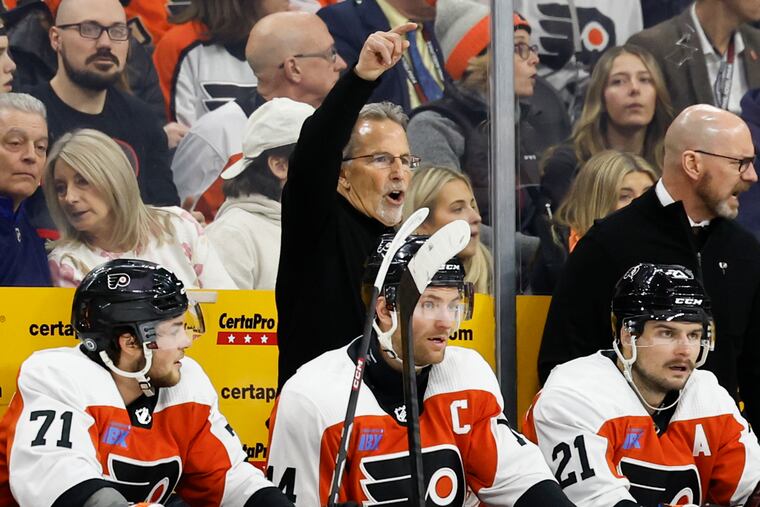John Tortorella’s rant Monday was familiar. It was also reason to wonder about his future with the Flyers.
He's blown up at teams before. It's what he does. But it also suggests that his shelf life here will be relatively short.

A John Tortorella press conference can be the guiltiest of pleasures. It’s like riding a roller coaster for the first time in the dark: You’re not sure where it’s going, so there’s a charge of surprise and excitement and dread throughout the journey, and when it ends, you’re a little exhilarated and a little relieved.
Tortorella’s press conference Monday night, after the Flyers’ 4-3 overtime loss to the Islanders, was that kind of ride. Less than two minutes, but full of ups and downs and thrills … and potential ramifications for him and the franchise. Anyone familiar with Tortorella’s career as a head coach has seen something like this from him before, and that’s reason enough to wonder just how long his half-life here will be.
Does that sound alarmist? Does it seem inappropriate, given that the Flyers are in the midst of a playoff race? Keep a few factors in mind.
While it would certainly benefit the Flyers to qualify for the postseason — it would energize the fan base and offer some validation for their rebuild — they don’t need to be a playoff team this season to get to where they want to be. They have a long road ahead of them before they can call themselves Stanley Cup contenders, and Tortorella is supposed to act as a culture-setter in that process. Survive Torts, the Flyers’ thinking goes, and you’ll be one of the chosen few still here if and when we’re an elite team again.
» READ MORE: Breaking down John Tortorella after latest loss: ‘Embarrassing ... for the Philadelphia Flyer uniform’
But that thinking might go only so far, because the two men overseeing this process — president Keith Jones and general manager Danny Brière — didn’t hire Tortorella. They inherited him. And for all the respect they have for him, for all his usefulness as the drill sergeant who will weed out the weak before the big battles begin, they can’t rely on The Torts Test as their only team-building criterion. Brière and Jones have their own opinions, and those opinions matter as much if not more than Tortorella’s, and when their opinions conflict with his, what then? Who will win out? And what if their differences are irreconcilable?
In that light, consider Monday night’s diatribe again. Tortorella couldn’t praise rookie goaltender Ivan Fedotov enough. He couldn’t have turned a hotter flamethrower toward the rest of the team. Fedotov was “the only guy [who] played.” Most of the other players were “soft.” Then he really got going.
“There are certain people [who] don’t have a clue how to play or just don’t have it in them to play in these types of situations,” Tortorella said. “And this is why I’m glad we’re playing them, because we have to figure things out as far as what we’re going to become as a team here. That was embarrassing, the second period, for the Philadelphia Flyer uniform. The way we played — embarrassing. High marks as far as we came back in the third — some guys.”
Who were the other guys? You can make some reasonable guesses. Travis Konecny stayed rooted on the bench for the third period’s first seven minutes. Joel Farabee was a ghost for much of the game. Morgan Frost scored with 9.6 seconds left to send the game to OT, only to commit a brutal turnover that led to Brock Nelson’s winning goal.
Only Tortorella knows for sure who his targets were. He stopped short of name-dropping any of the culprits. But assume for the sake of argument — and it seems a safe assumption — that Konecny was one of them. He isn’t just a fungible third-line forward. The Flyers regard him as a centerpiece player, a unique talent who can play on the power play, can kill penalties, and has that “it factor” that could make him a leader and fixture here.
But Konecny also has just one year remaining on his contract, and if Tortorella is benching him during the most important game of the regular season, how much should that short-term decision factor into the Flyers’ long-term decision about re-signing him? And if they are committed to keeping Konecny, who is in the midst of a second consecutive 30-goal season, can they be as committed to keeping Tortorella?
These questions aren’t baseless. There’s history here. With Tortorella, there always is. He’s a terrific coach, and there’s more to him than the combative, defensive posture he often adopts with the media. But he’s no stranger to these kinds of when-push-comes-to-shove moments. While coaching the New York Rangers during a 2013 playoff series against the Boston Bruins, for instance, he was asked why he didn’t use Carl Hagelin, one of New York’s best and most skilled forwards, to bolster a struggling power play.
» READ MORE: Ivan Fedotov’s addition shakes up the Flyers’ goalie rotation. Here’s where it stands.
“Because he stinks on the power play,” Tortorella told an assembly of reporters after a practice. “I don’t know why. I wish I could play him on the power play. Every time I put him on, he stinks.”
Then, with his team down three games to none in that same series, Tortorella scratched Brad Richards — the highest-paid player on the roster — for Game 4. A very public tongue-lashing. The benching of a high-profile player. Hmmm. Less than a week after the Bruins eliminated them, the Rangers fired Tortorella. That’s the other thing about roller coasters. They can leave people sick to their stomachs, and some of those people would prefer not to go through the experience again.